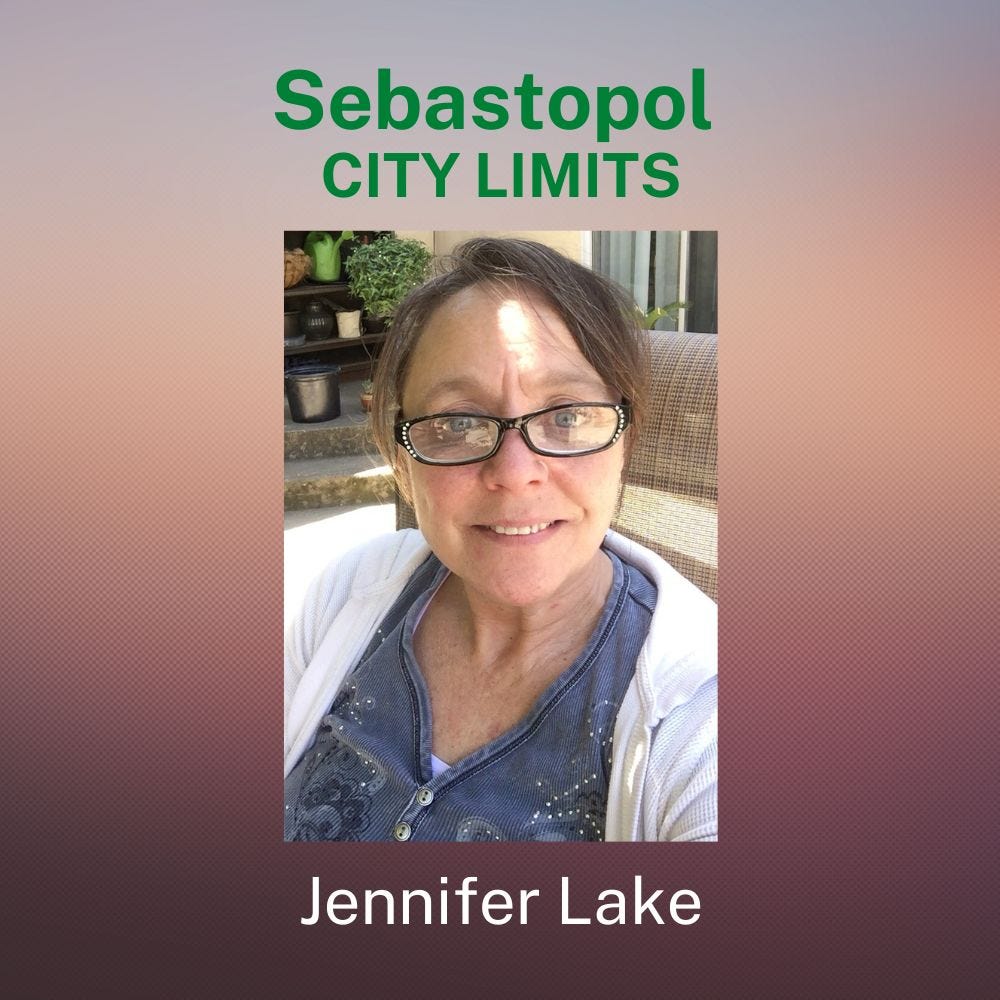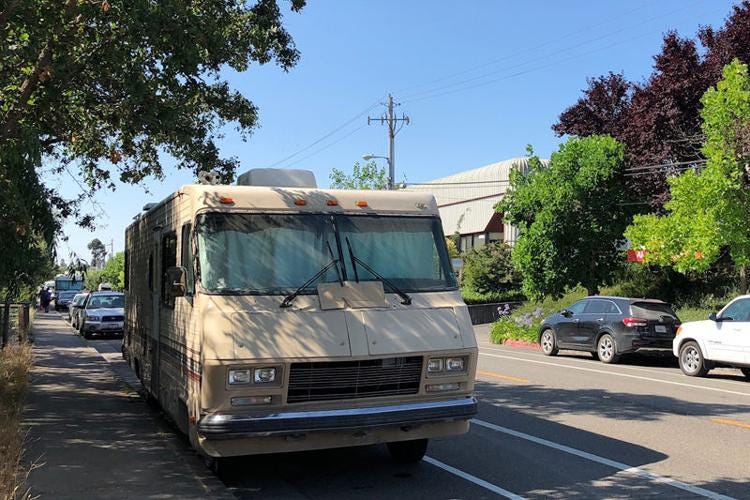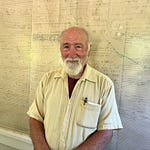Note (January 17): After publishing this interview, I learned that Jennifer will be leaving WCCS to take a job working in senior housing.
In the summer of 2021, those who lived in RVs parked on Morris Street near the Barlow had become a problem that the city had to deal with. The conditions were becoming hazardous for those who lived there, with debris accumulating on the street. One RV caught on fire. Reports of criminal activity increased as did complaints from merchants and citizens.
The City Council agreed to fund an Outreach Coordinator through West County Community Services and that job went to Jennifer Lake. For 18 months, she has been talking with the homeless (or “unhoused” the term preferred by activists), understanding their issues and educating them about what services are available. She also talks to the community, interfacing with citizens, city staff, and the police department.
Jennifer Lake just might just have the hardest job in town. A homeless survivor herself, who found a career in social services working with vulnerable people, she is a go-between, a coach, an educator working with the chronically homeless.
Morris Street was cleared of RVs in October 2021, the subject now of a lawsuit. Elderberry Commons and the Horizon Shine RV Park were established and have been able to provide permanent or temporary housing. But they are now full and there are about 24 homeless who are “living in the rough” — in vehicles, tents and doorways.
Jennifer works with them, meeting them in person and checking in with them by phone. She does research and talks to service providers at shelters, mental health and drug treatment. She also works with the community who are concerned about the homeless and fearful of them. She hopes for more dialogue between both sides to reduce tensions. Working with the homeless is a slow, uncertain process. “You chip away at it,” says Lake.
Nonetheless, Lake believes good progress was made in 2022 in dealing with the homeless in Sebastopol, helping the majority of them find housing. The contract with the City of Sebastopol that funds Lake’s job will be up for review and possible renewal in the summer.
The Homeless Point in Time Count for 2022, conducted by volunteers working with the Sonoma County Community Development Commission, reported that there were 2,893 homeless in the county. (Link) The report found 127 in West County; 78 in Sebastopol and 49 in the unincorporated areas. The total numbers in West County were down from 327 in the previous count for 2020. The 2023 Homeless Point in Time Count will take place on Friday, January 27th from approximately 5:00am to 10:00am.
Transcript
Dale: I'm joined today by Jennifer Lake who is an outreach coordinator for West County Community Services. We'll learn more about what she does and what she sees in her role interfacing with the homeless in Sebastopol.
Welcome Jennifer. Nice to have you.
Jennifer: It's nice to be here.
Dale: Good. Give me some background on you. Where'd you grow up? How'd you get here if you didn't grow up here in Sebastopol and what you do?
Jennifer: I actually did not grow up in Sonoma County at all. I moved here when my son. was a newborn. So that would've been about 31 years ago. And I lived in Santa Rosa for most of those years. Raised my kids there. About four or five years ago, we moved out to West County, out to Monte Rio to-- it was part of my financial plan. Rent our house and we'll move to a smaller place. The kids are grown, that kind of thing. Pay off our debt and then do something else. And so that's how I ended up in West County. And I've been doing social service work for this county my whole career.
Since I was 29 years old, I've been working with our communities most vulnerable populations, whether it be survivors of domestic violence and sexual assault. And then it was substance abuse treatment centers. And then homeless families. And then, most recently, in the last eight years, it's been with chronically homeless individuals at other agencies I've been with.
Then Covid happened and then I was home for 18 months, and then I started to work for West County Community Services in July of ’21. So I've been here about 18 months. So that is my introduction to Sebastopol. West County then contracted with the City of Sebastopol, so I work under a contract for the City.
And my role is really just to help address the issues that are associated with the homeless population-- to address the issues, try to help people figure out where they want to go, how do they want to get housed, what are their barriers, things like that.
Dale: Can you give me an idea of what a typical day looks like for you?
Jennifer: A typical day. At first I had an agenda and I would come with certain places I was going to go because the beginning of my position here was really focused on Morris Street. The largest population of homeless in Sebastopol were there and every day I would just go out to Morris Street. At first you've got to figure out what time is the best time to be there. And then I just go and I just talk to people. In the beginning, I talked to everybody, so it took my whole day to talk to this person, that person. And sometimes they would have needs that would take up time. And so I was constantly working.
I felt like I was working a lot. As we've expanded and dealt with Morris and got some solutions for people, got some people off the street, my typical day today is that a lot of what I do is on the phone now. I do a lot of research, so I go out, I have about 24 individuals that I check in with all the time, who are not in the RV park. They're either sleeping outside or in a tent somewhere or an RV. These are people that are sleeping outside in the rough.
Dale: About 24 of them.
Jennifer: About 24 of them. And the 24 doesn't mean that I'm intensively working with them. I serve one or two people at a time in terms of longer term solutions. And it depends on who's willing, because they're not all willing to, they're all on. There's a continuum of where they're at, where the mindset is.
It's just worked out that I'm usually helping one or two people in a more intense way, like giving them rides to social services or giving them rides to Social Security office, or helping with applications for financial assistance or food assistance or brainstorming where they can live or what their barrier, if they have a barrier, say they have, they need some mental health treatment or they need to get connected to medical or mental health.
So all those things are assessed as we go along.
Dale: Did someone tell you that there's a homeless person somewhere and you have to go talk to them?
Jennifer: Yeah. More now, as time has gone by, people have become aware of me. Specifically, in the last maybe month and a half, I did a presentation at the library.
And after that, it's starting to pick up a little where the community members call me and refer somebody. Sometimes they tell me about people I'm already working with, and I just listen. Maybe I get some more intel that helps me help them further sometimes, but most of the time I worked with the people that they're calling about.
And what I think is great about that is because we were able to build this bridge between the community and the unhoused in a way that they feel comfortable calling me. And I deal with that. And everybody feels they found a solution to whatever it is that was bothering them.
The community member had their thing and then unhoused. It minimized any of that heated conversations or stress or trauma.
Dale: Before you were in that position or that position existed, how did these situations get handled? By the police mostly?
Jennifer: I was really hired to help with Morris Street and help educate both community and the unhoused living in the Laguna and on Morris Street about health and safety codes and how they were violating them and why it wasn't a good thing.
For instance, one of the concerns was the biohazards -- the debris and things like that-- and how unsafe that is for your health and wellbeing. So I spent my first month and -- they were going to do a sweep-- so I spent my first month and a half walking around and talking to people about the hazards and the danger that the risk that they put themselves in when they don't dispose of biohazard safely or they live in areas where there's debris everywhere that's not healthy and how it affects them and how it long term affects the community.
It didn't seem like very long before we were able to clear that part of it up. That's what I did. I was educating people, letting them know about the sweep.
Dale: Was that the summer of, what, 2021?
Jennifer: Yeah, it was, we did the sweep in October, I believe it was the end of September, 1st of October.
Dale: A year ago.
Jennifer: It was an immersion program for an outreach worker because they had all this-- active site pretty much when I started. So that's how I met everybody. So now knowing everybody, I was able to put a focus on the community and help them understand the situation a little. Clear up some myths and things like that about homeless folks.
Dale: Like what are some of those myths?
Jennifer: Just it's just the same stereotypical view of a homeless person. They're not all on drugs. They're not all mentally ill, and that's the first go-to. And so it causes all this stress. What I mean about myths is that the average community does not really understand what it takes to be homeless. People don't choose to be homeless. Sometimes they're homeless. There are people who have been homeless and now across the county, not just Sebastopol who were homeless because of the fires.
They just didn't have renter's insurance or didn't have whatever. And so they bought an RV. They thought that'd be the thing to do. They ended up on a Morris Street. There was a couple on Morris Street. Sometimes they live paycheck to paycheck.
They didn't have the the job that they wanted, or they got laid off during Covid or ....Covid caused a lot of unemployment for some of them too. And so that's when they started to grow. So the stereotype is really that if you let these unhoused into my neighborhood, then they're going to bring with them the site that you saw on Morris -- the debris and the criminal activities and things like that.
Okay, so here's the thing. There's a lot of hater things that happen when the people do not -- people NIMBYs, not in my backyard, do not want the homeless encampment in their neighborhood, right?
So there's a lot of tension that gets built and it was building up down there, down Morris Street and it builds up in Rohnert Park, in Santa Rosa. And that's when you get all these news stories and people involved and where they're saying, you know what? They're blaming them for being homeless.
Just get a job. What's your problem?
Have you ever lived on the street? If you did, then you would know. That's an ignorant statement. How do I get a job when I'm trying to figure out how I'm going to feed myself today? How do I get a job when I have nowhere to put my head and it's pouring down rain, and it's freezing weather. You want me, you think I can just get a job. How do I maintain a job if I have nowhere to shower so I can show up at a job? People say things out of that tension that I think we've been able to ---
I am so incredibly impressed with the Sebastopol's ability to be compassionate. I've worked with law enforcement my whole career in one capacity or another, and they literally care in Sebastopol.
You want them to just get themselves together, follow a few simple rules, which I spent a lot of time educating them on, and not lecturing, but saying, Hey do you know that you can get really sick if you don't make sure this is cleaned up? Things like that.
And I think that what Sebastopol did with opening up the RV village to take some of them over there. And then me housing a couple few that I can along the way. And then meeting all of them. I literally know pretty much all the homeless in Sebastopol at this point.
Dale: When you say you know all of them, what should we know about them? Not necessarily individually, and what kind of help they need?
Jennifer: It's not like what you should, what the community should know about them. It's what the community needs to know is what they can do to support their continued healing and moving up and forward. My whole goal has been to go out and meet people, build relationships with this community, build relationships with the city's staff, law enforcement and public works, and reach out, provide outreach to the community in some way, whether that be a volunteer project or presentations or working with Safe Parking, the other program where you park and you're sleeping in your car there. But through all of that, and then going to the different churches, so through all of that, extend myself into the community so I can begin to educate them on, just, when people say things like they just get a job then that's my opportunity to say, they would, but they need these four things in order to even feel like they can get a job. It's not easy to be surviving your own life and then showing up to do a job, like a regular nine to five job because you're too stressed out.
You're in trauma land and you make mistakes and then the experience is even worse, which throws you back down into your trauma. My goal was, and I understanding that myself, I have been in their shoes at one point in my life, 30 years ago, and that's how I got into this work in the first place was that I was homeless with my family and I turned it into a career.
I came into this job thinking the only thing I want to do, my only main objective is to try to figure out what it is that keeps them from being housed and help them to address that. It's worked pretty much. I think we counted in the homeless count about 124. I think it's about 124, and 78 of those people were housed or off the streets of Sebastopol after a year or after these 18 months. And now I've got two going into housing hopefully in the next couple of months. So what we're doing is working, people are becoming interested. I don't have to seek out people anymore. They come and they look for me. They're calling me, the unhoused and the community, to help each other, which I think is a real bonus. When I got here, everybody was not. Because the community was upset, rightfully because, the things right there by the businesses was really not attractive.
And then the unhoused were upset because they were feeling the pressure. You know what I mean? So it was like a tension thing. And now I feel like it's really gotten to a manageable level.
Dale: So you would say that in a year, just in the calendar year 2022, we've made pretty good progress?
Jennifer: Oh, absolutely. I know we have. That's something I can definitely say. We literally got I think 78 out of 124 people off the streets. Doesn't mean they haven't come back or they won't come back, or that they got permanent housing, but they got off the streets and they were either in shelters or with friends or moved on to family in another state or or they got permanently housed. There's a few of those too. And that is significant because the numbers aren't generally that high, but the reason it's that high is because of the RV village; they consider that temporarily housed.
So we took the majority of the homeless from Sebastopol into the village, and then I'm working with all the people that are outside of that right now. So that's, so once that was done then, now I worked with all the people that are living outside and not in the village. So they don't have anywhere to go. They're sleeping outside.
Dale: Just more recently, we had below freezing temperatures. This week we have torrential rain. What can you do for folks during these times? And the there was a warming center set up.
Jennifer: It's the responsibility of the cities, the municipalities across our country to care in emergency situations like that-- to call the emergency and to set those things up. I don't set them up. What I do to support the effort. It was actually not me that set up the warming center. It was Diana Rich from the city council and I worked with her to figure out how we would do it. And so that's one answer. In freezing cold weather, I think the standard in the county is three consecutive days at 32 degrees is when it's considered a crisis. You open warming centers, which is when you see everybody opening them.
The rain is not as unless it's raining and freezing, they probably wouldn't open an emergency center or it's flooding. So I was waiting yesterday to see if anybody would say we needed to do that, but I haven't heard it with the rain.
Dale: So one that might be a myth, but I think one of the things people say is as soon as you start providing services to the homeless, you just get more homeless.
Jennifer: It depends on the services that you provide. A good example of that would be the homeless people are looking for resources and support and obviously they need it. So if you have approved a space for RV's to park, for instance, and they find out in other cities that they can park there, but they're not allowed; they're changing laws in other cities and so they can't park there.
Then that's when they start coming. Oh, they can park over in Sebastopol. We'll move there. There has to be something that draws them here. So when in the beginning when I got some fund that wanted to fund registrations for folks.
Dale: Right.
Jennifer: There was 13 RVs when I was here, but by the time everyone across this little county here, closer cities, heard that I was doing registrations, it grew from 13 to 37. So that's when everything was getting really tense. So they heard that and I kept sending people away. If you haven't been here more than two weeks you just might as well leave. And people did leave, because they were only there for me to help them with their registration.
We should do that differently next time we do that for sure. But that's what I mean though, something draws them to here. So now what people come here for, or like in this city, they would come here for if they had an RV, they're calling to find out if they can get into the RV village now.
It's full. It's going to be full for a while and when it's not full, there's people on the waiting list. So you see they don't just show up randomly. People are not flocking into Sebastopol right now. It doesn't mean that I don't serve new people every week because I do.
But generally they're passing through and I'm helping them relocate. And that's the other thing that's important about what I've been doing is when I meet new folks that have not been here, that they literally just got here and they cruising through because they're going to Alaska or something like that.
I'm talking to them about their trip and what brings them here and are you planning on moving here? Like I'm asking them questions because I've gained some trust with them so they answer them. They're more truthful. And I've been able to help people move on to where their destination was, or get their repair fixed so that they can go back to wherever they were staying or their back, RV, rent, whatever it is, so that they don't end up on the streets of Sebastopol because they have nowhere to go.
Dale: Are people that you help aware of the services that are available to them? You talked about connecting them to services. Do they know that they could be helped?
Jennifer: Some of them do, some of them don't.
Dale: Okay.
Jennifer: And some of them are afraid to take help. Like they, they don't get Social Security. They're old enough to get Social Security, but they don't because they're afraid to go down there and apply. They don't want their name or stuff in the system, stuff like that. Mental health or stress conditions like that. So I spend a lot of time, I like to say, pulling them out of the trees, but I spend a lot of time just talking to them, reframing how they're seeing this support service that they're being offered. They gather this information as they've been working, living on the streets and stuff. So sometimes they have inaccurate information about the service itself.
Dale: Yeah, I can imagine.
Jennifer: There are some that are very challenging to get to take services at all.
Dale: So talk about that. That's interesting that some people just don't want to be helped .
Jennifer: It's a fear thing though. It's not that they don't want to be helped because I, because I did this little experiment, like if I asked everyone, so if I had some keys right now to this cottage in Sebastopol, cause everybody wants to stay here. Who's been here? They don't want to leave. And I said, so if I had these keys to this cottage would you take it or not?
Because a lot of them say, oh, I don't even, I don't even think you could house me because, I've been doing this for 20 years and I don't think I would want to be in a house. I'm like, what if I had keys to a cottage? And if there was no strings attached. It was just yours. You could just move in, take over. Would you take it?
And most of them say yes, those hardcore ones, they're like, Nope, no, probably not. I'll probably go in there for a minute and then I give you back your keys. But those are the ones that are generally they're fearful of. They've they go out and they apply for things or they apply for things in their past, or they were married in the past, or they had kids in the past and they difficult situations where they were on AIDS. So there's all kinds of reasons why they just don't want to apply for things or they don't want to take access to certain services. And so it's just a lot of conversation about--. For instance, people don't want to take shelter and the reason they don't want to take shelters is because of the rules, but it's not always generally because of the rules. That's just their go-to. You just spend a little more time asking them questions about is it really the rules? Because I worked at every shelter in this county and I can tell you what each environment looks like, it feels like. In fact, I wouldn't want to refer you to this one because you're this kind of person.
Those are the types of conversations that I'm having. And then eventually they'll take it, but sometimes it took me 10 months to get somebody to take shelter this recently. Ten months of the 18 I've been here and they finally took shelter.
Dale: And how long would that shelter work for them. Was that a temporary?
Jennifer: About a week
Dale: About a week.
Jennifer: And then they were back because they don't want to leave Sebastopol and Sebastopol doesn't have a shelter. If Sebastopol had a shelter, I think some of those folks that I'm referring to that don't want to utilize services would probably use it, but they just feel like they shouldn't have to leave.
They lived here their whole lives, this couple lived here their whole lives, and they became homeless for different reasons. They don't want to leave and they'll go for temp and I just say, Hey, just it's a temporary break. Go take a break. So you can map out your strategy on how you're going to get through.
It's just education. I really see this role as a coaching/education kind of thing for people that are willing to hear you out. I've gotten people to go into treatment, to go to detox, just by having these conversations. It's not like I did the work.
I don't do any work for them. They do it themselves. I link them to services. And then if they needed me to sit with them while they filled it out or something like that or talk, go with them while they go to court-- look, I'll do those things, but I will not do the work.
Dale: So while it's a generalization we make about mental illness and drugs, yeah. It is a, nonetheless this population oh, it's a high suffers from that.
Jennifer: High percentage. I'm not trying to minimize it, believe me, because it's really frustrating sometimes. But it's not, it's just such a general, even though the high percentage of them do face those issues and concerns, there is help out there for them.
That's what the county's mobile health team, health and mental health wellbeing teams that they have, it's called, I M D T is what it is called. They bring social workers and they have more resources to connect them to treatment or get them into a situation where they can be assessed for medications and things like that.
But it's so those things are so challenging to access sometimes because you have to have everybody's buy-in, including the client. For instance, if I say I want to go to treatment, I just have to go. I need to go. When you're working with somebody who's an addict and they say they want to go, you pretty much want to move quickly because they're going to change their mind.
It's really hard to access the county services in that kind of situation because you get first they got to come here and then they got to see this person. By that time you've lost him.
Dale: While you're working in Sebastopol, are most of the services that you're trying to plug them into-- the county's responsible for them rather than the city?
Jennifer: A lot. Yeah, pretty much most of them because there's services in Sebastopol that cover food and clothing. West County has the West County Homeless Health Center out there in Guerneville.
So they come in into this area. So there's services here, but when it comes to housing somebody, I think that West County Community Services is it. I don't know of anybody else who's doing housing in Sebastopol.
Dale: But drug treatment?
Jennifer: Drug treatment is hard because number one, the county doesn't have enough beds for all the people that are on drugs in our community. So even if you get them ready for, if somebody says they want to take treatment, unless the county's been involved and they've been working with this person on mental health issues to begin with.
it's really hard to get a bed immediately. And I think if anybody could have the magic answer, it would be save certain beds. I know four people who are ready to go right now, and it's not always, they don't always need to go straight to detox because that would be the immediate right there.
When I ran the Safe House program for the YMCA, I had two beds set aside. They were never filled by anybody other than imminent danger. So if somebody called and they had to flee their home right then and there, there was always at least a bed, one bed.
I don't know if the treatment centers do that. I do a lot of research and, for the most part, treatment centers are really, they're full, just like the shelters. Everybody's full. And with the fentanyl epidemic in our country and in our county they're really full.
So I don't know what the answer is to that. I love the coordinated entry process, only for this reason, is that it's highlighting what the actual real need is for treatments, for treatment options. Without that, there was no prioritization.
And oh, you want to go to treatment? It was willy nilly. The coordinated effort, they said, oh, they need treatment first before they can get this. So they're trying to assess what they have to manage before they get housed. So that's been very helpful.
Dale: The other was the criminal activity associated with homeless. That people, citizens complain about that on Morris Street and then they're moved up to the Horizon Shine and people complain about that activity. It's hard to know. Does the activity move up there?
Jennifer: Yeah I know what you mean, the activity. Okay. So on Morris Street, there was no program, there was no structure. It wasn't like you moved into Park Village, for instance. The West County runs the Park Village. It's a contained environment. There's a property manager and there's people running it. You sign a lease and you do all these things to make sure that there's order amongst us. There wasn't that there, so there was things that went on that were just inappropriate or the business owners were taking the brunt of that for a very long time.
I could totally see both sides of this. And then the new neighborhood where they moved, they were worried that this was going to happen in their neighborhood and it was going to come to them. And there's still a level of that because people are afraid of it. Nobody wants that kind of thing in their neighborhood.
What has happened though is they've done a really good job of putting together the RV Village and they have a program there. They sign these documents that say they're going to follow these rules and they're going to keep the noise down and they're going to not harass neighbors and all that, whatever the rules are. They have some order and structure there, and that's all that's really needed. I think everybody needs a little bit of structure, whether they think they do or not.
I have watched them. They're still dealing with issues and things like that need to be addressed so they can get housed. But I've watched them progress to where I think the neighbors have even felt that it's not as bad as they thought it would be.
Dale: Apart from those two the Elderberry Commons and the Horizon Shine, are most of our homeless in vehicles?
Jennifer: 50 50. I see there's people that sleep in door wells and there's people that sleep over by the post office. They're just people that sleep without a tent or anything. And I would say that there's probably. It's probably more of those than there are in cars.
A lot of the people that I've met around, just in both here and around the county who sleep in cars are under the radar. They register their cars. They have a job. They do all the things. They just don't have a place to live. They sleep in their car. And they move around all the time.
So they can hide from me even. This isn't that big of a city. And so when I'm looking for them, because we're working on stuff and they don't want to do it, I can't find them. They don't even tell me where they park. That's how much under the radar a lot of these folks that sleep in their cars are.
And so when I find them, I offer them safe parking at Community Church because at least there they don't have to be so under the radar and I can start to work with them more and get them housed. Because ultimately that is what they want. They want to be able to get off the streets. And there are people who have slept in their car for 4 or 5, 6, 7 years.
There was one couple that was in their car for 15 years by the time we housed them. And they were the first ones that I housed when I first got the job. So it was very cool. But interestingly enough, they didn't think that it was going to work for them. They had all kinds of reasons. They were naysayers. No I can't do that. I've done that. I've tried that. I've done it.
Dale: And did it work for them?
Jennifer: It did work for them, but I had to spend, I don't know, some month or so just reframing that and saying you don't know, things change. Like that kind of stuff. Just talking to them over and over again about.
Dale: You mentioned coaching earlier.
Jennifer: I feel like that's what it is.
Dale: And I guess the hard part of your job is that it takes a while.
Jennifer: Not for all of them.
Dale: Gain their trust and be able to communicate and find the services they need and help them move along. It's not always progressive in its movement; it goes back and forth sometimes.
Jennifer: Yeah. And that's what the community sees. They see this person coming in their neighborhood. They want to know why he is there. And they call and I go help them. I've already met the person I know. So we can go and we handle it and we get them to move on. But what they don't realize, what the community doesn't realize is that some of these folks that they're calling about, I've been working with them for 3, 4, 5 months. They're this close to taking services or this close to doing whatever it is they need to do to get an income so they can even think about renting a room. The community wouldn't know that. Nobody can know that. I'm not running around telling people's business.
Dale: Do you have colleagues in other cities that you're able to of share information about the kinds of services that are offered or what helps people in general and learn more about then just say Sebastopol's view of it?
Jennifer: Absolutely. There's a lot of that. We do trainings and there's a lot of collaboration between each other. In terms of services, like if I meet, I'm doing a lot of research right now, so if you've been around doing it for a while, you might not be doing research because you know it all, right. But I'm finding all the new changes and so I go around and I share that and I send it out to people, my colleagues at West County.
So we're always networking together. In terms of trainings, there's specific trainings that we get and that we share, and usually it's spearheaded by either your agency or the Continuum of Care. Sonoma County Community Development Commission. So they send out, there's a training on housing first. Everybody should go to housing first, which is the model that Sonoma County has adopted. Then, you can sign up for this training and go to the training. So we all share that information with each other. I think we're pretty good as a county in that way.
Dale: How about cities along the river like Guerneville? How are they experiencing homelessness differently than Sebastopol? Do they have comparative numbers?
Jennifer: Oh yeah. I think Guerneville might even have more than the city. I don't know what Greenville's population is. I wish I did. But I would say that the home, the number of homelesses in and I could get this information for you actually, if we looked at the homeless count that they did.
Dale: When was that done?
Jennifer: It's done every January. They're gearing up to do it again for this year. You can go onto Sonoma County Community Development Commission.
Dale: What's the Continuum of Care that you're saying? What is that?
Jennifer: Oh, it's a meeting. It's just a meeting that they have. It's like the bureaucracy meeting, like the political meeting that they have, where they disperse funds and I sat on that meeting forever but the Sonoma County Community Development Commission is the agency that you. You can go on the website and they have the homeless count up there.
Dale: I guess to summarize, there's been some good progress made. But this isn't something that you win at. You have to keep doing. And doing it.
Jennifer: You, is it something that I win?
Dale: You don't solve the problem. Oh, it doesn't go away.
Jennifer: You chip away at it. I don't believe that we will end homelessness. You're, there will always be people who choose to live on the streets. So I know that the county and the government and there's all these initiatives to end homelessness and everyone would like that, including me.
But I've talked to so many people that like this, the one gentleman says: I'm not going to, I've been out here too. I wouldn't even take housing from you. He's consistent with that statement and he's a really nice person and he's active in what he does around Sebastopol, everybody likes him. I don't know that he would take housing.
So for instance, I don't see that we'll end homelessness, but I think that we are making great progress. At least in Sebastopol. I can only speak for Sebastopol. I'm not looking at the numbers elsewhere.
Dale: Good. Thank you for your time today. I really appreciate getting some of this and and just. I'm interested in educating us, myself, about how do we help? How do we not help?
Jennifer: I would love to prepare a presentation or something because there's so many things that we do as a community that would be very helpful and it would also be rewarding for both. Just having a dialogue. I think the biggest thing about the myths -- the bias that people have against the community, against the homeless, against law enforcement, it all comes from fear. If there was more dialogue between those folks, like there's a push to get homeless folks onto committees and be part of the decision-making process, even going to city council meetings for public comment or something like that.
There's also through the Sonoma County Development Commission, they're starting one where they're encouraging survivors of homelessness or currently homeless to join a committee where they advise people on how they're spending their money or building programs or what have you.
And I was very happy to see that. Anytime that we can dialogue amongst each other instead of attack, blaming, shaming, or instead of reacting, anytime we can just sit down and have a conversation, we're not reacting is only going to make it better. And I've seen that happen.
I've seen people talking more to each other. There's less tension, like when you go to the Barlow because there's still a few homeless around there. So there's less tension. Only maybe it comes up every now and then, like from one community member instead a group of them, like NIMBYs, and I think that it has to do with the dialogue that we've been having. They've been having town meetings, the warming space center that Diana Rich, coordinated and all of that we put on. I was able to recruit, give people to get in there. There was nothing to worry about.
The Community Center opened their doors and this is a community center that was right next to all of the action that was happening down there. And offered their gym for this warming center. It was perfectly run. There was no problem whatsoever. Granted there was only six to 10 people there at any given time. But still I feel like that's gotten better as well. And I think it's dialogue.
Dale: More dialogue, more understanding.
Jennifer: Understanding that most of the reasons why we're reacting is because we're fearful. Community members are fearful that their businesses are impacted as they should be. They already went through Covid, and then the homeless are fearful that they're going to get ticketed every five minutes because they were getting ticketed every five minutes. But instead of just punishing this way, If we could just sit down at a round table, say: listen, I'm sick of this and I'm sick of this. What's the solution? And you have the chief and whoever the decision makers are up there. And then you come up with something that everybody agrees to, which in my opinion was, what we've done here in Sebastopol. I think it's a good model.
Dale: Again, thank you for your time today. Part of it is just making this a human problem.
Jennifer: That's a better way of saying it. Thank you. It is a human problem.













